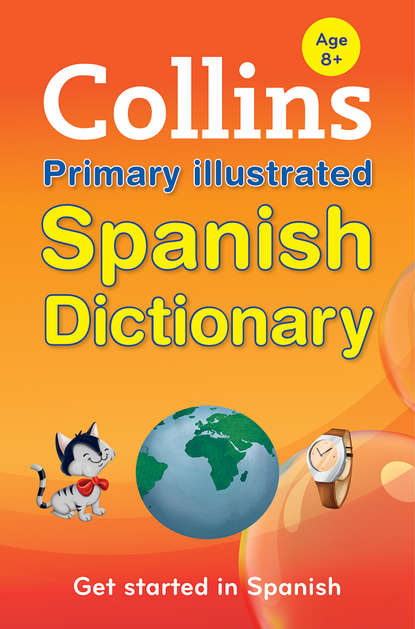
Полная версия:
Collins Primary Dictionaries

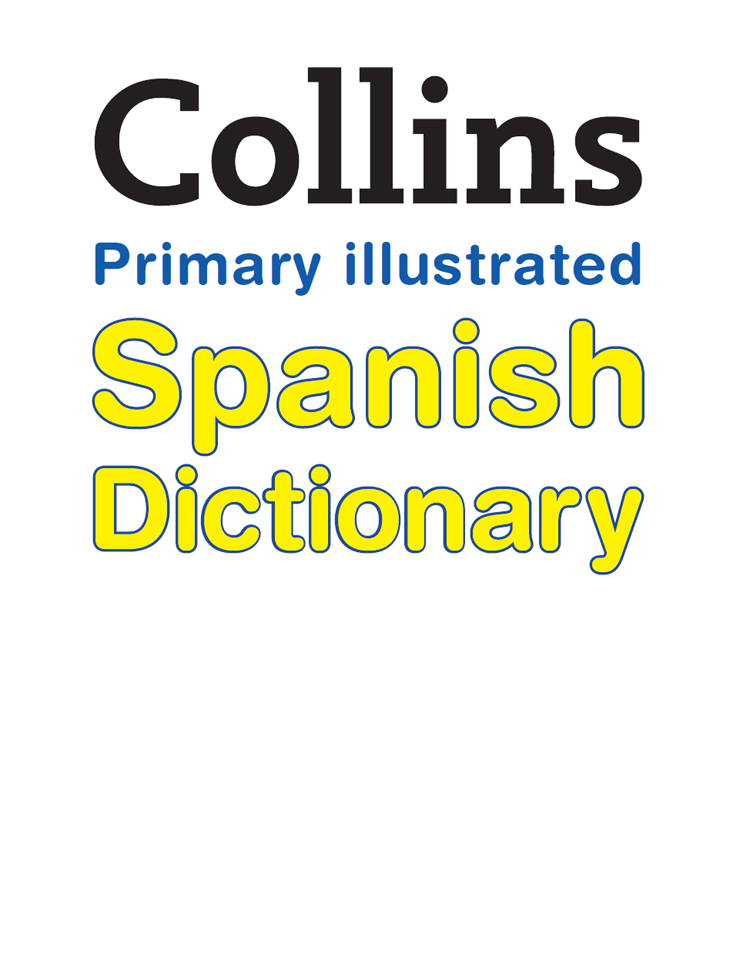
HarperCollins Publishers Westerhill Road Bishopbriggs Glasgow G64 2QT Great Britain
www.collinsdictionary.com www.collins.co.uk
First Edition 2015
Previously published as Collins First Time Spanish Dictionary 2003, 2008, 2012
© HarperCollins Publishers 2015
eBook Edition © February 2015 ISBN 978-0-00-811574-6
Version: 2015-02-27
Collins® is a registered trademark of HarperCollins Publishers Limited
A catalogue record for this book is available from the British Library
Art direction by Mark Thomson
Designed by Wolfgang Homola
Typeset by Davidson Pre-Press, Glasgow
Acknowledgements We would like to thank those authors and publishers who kindly gave permission for copyright material to be used in the Collins Corpus. We would also like to thank Times Newspapers Ltd for providing valuable data.
All rights reserved under International and Pan-American Copyright Conventions. By payment of the required fees, you have been granted the non-exclusive, non-transferable right to access and read the text of this e-book on screen. No part of this text may be reproduced, transmitted, downloaded, decompiled, reverse engineered, or stored in or introduced into any information storage and retrieval system, in any form or by any means, whether electronic or mechanical, now known or hereinafter invented, without the express written permission of HarperCollins.
Entered words that we have reason to believe constitute trademarks have been designated as such. However, neither the presence nor absence of such designation should be regarded as affecting the legal status of any trademark.
HarperCollins does not warrant that www.collinsdictionary.com, www.collins.co.uk or any other website mentioned in this title will be provided uninterrupted, that any website will be error free, that defects will be corrected, or that the website or the server that makes it available are free of viruses or bugs. For full terms and conditions please refer to the site terms provided on the website.
PUBLISHING DIRECTOR
Rob Scriven
MANAGING EDITOR
Gaëlle Amiot-Cadey
PROJECT MANAGEMENT
Alex Hepworth
Susanne Reichert
CONTRIBUTORS
Morven Dooner
Cordelia Lilly
Julie Muleba
José María Ruiz Vaca
Malihé Forghani-Nowbari
José Antonio Gálvez Castiella
ILLUSTRATIONS
Q2A Media
ILLUSTRATED SUPPLEMENT
Marcella Grassi
© Boroli Editore 2008
Contents
Cover
Title Page
Copyright
Introduction
Using the dictionary
Parts of speech
Answer key
Spanish – English
Language plus
Animals
Body
Clothes
Colours
Family
Days and dates
Weather
Places
Food
Fruit and vegetables
Drinks
Furniture
Jobs
At school
Rooms
Numbers and time
Spanish verbs
Illustrations
English – Spanish
About the Publisher
Introduction
The Collins Primary Illustrated Spanish Dictionary is a new bilingual dictionary aimed at primary school children who are starting to learn Spanish.
Access to a dictionary which is pitched at an appropriate level is a vital part of the language-learning process. The content of this dictionary has been carefully selected to reflect current trends in primary education and help children with acquiring basic language-learning skills.
The key aims of the Collins Primary Illustrated Spanish Dictionary are:
• to develop both language skills in Spanish and language learning skills in general
• to cover the four key areas of language attainment: listening, speaking, reading and writing
• to reinforce key aspects of the language by the use of notes and feature boxes throughout the entries
• to extend cultural awareness by providing information about Spain, especially where traditions differ from those in Britain
The Collins Primary Illustrated Spanish Dictionary supports language learning in a number of specific ways:
• it develops children’s knowledge of how language works by encouraging them to understand, analyse and use simple aspects of grammar
• it develops children’s individual learning skills by using a wide range of notes that explain things in a simple but interesting way
• it enables children to make comparisons between Spanish and English by encouraging them to explore the similarities and differences between the two languages and cultures
• it introduces young learners to all the basic elements of a bilingual dictionary and provides detailed instructions on how to get the most out of using the dictionary
The Collins Primary Illustrated Spanish Dictionary is presented in an easy-to-use format which is intended to appeal to children of primary school age. It provides lots of simple, relevant examples and tips on how to remember words, and how to avoid some of the pitfalls of translation. It also features key phrases, illustrations and information about life in Spain, making it an invaluable and exciting new resource.
Using the dictionary
Step one:
Pick the right side
Remember there are two halves to the dictionary. If you want to know what a Spanish word means, look in the first half of the dictionary.
If you want to translate an English word into Spanish, look in the second half, which is English-Spanish. It comes after the supplement in the middle of the dictionary.
1 Which of these words would you look up on the Spanish-English side of the dictionary?
ver brother horse teléfono
2 Look at page 51 of the dictionary. Is this the Spanish side or the English side? How can you tell?
3 Look at page 150 of the dictionary. What is shown at the top of the page, down the side?
4 Is invite the first or the last word on page 437?
Remember that you do not read across the whole page in a dictionary – you have to read down the columns.
5 Which word comes immediately after aburrido?
Step two:
Find the right word
A B C D E F G H I J K L M N O P Q R S T U V W X Y Z
Words are in alphabetical order in the dictionary – like names in the phone book, and in a school register. The alphabet is shown down the edge of each page of the dictionary. You can sort words into alphabetical order by looking at the first letter of each word.
6 Can you put these names in alphabetical order?
María, Isabel, Juan, Jorge, David, Arturo, Carmen
When two words start with the same letter, look at their second letters.
7 In alphabetical order which comes first – Juan or Jorge?
8 This is the order of the days of the week on a calendar:
Monday, Tuesday, Wednesday, Thursday, Friday, Saturday, Sunday
Which day comes first in a dictionary? Which comes last?
9 Thursday comes before Tuesday in a dictionary. Why?
10 Put the seven days of the week into alphabetical order. If the first letters are the same, and the second letters are the same, look at the third letters.
11 June, July, August: which comes last in the dictionary?
Step three:
Pick the right translation
The translations are easy to spot in this dictionary because they are blue on the English-Spanish side and red on the Spanish-English side.
Spanish words can be masculine or feminine, and singular or plural. In the dictionary you will come across the abbreviations masc and fem, which tell you the gender of a Spanish word. PL tells you the word is plural. The dictionary also shows you the Spanish word for ‘the’ (this can be el, la, los or las). In the Language plus supplement, NOUN is abbreviated to N and ADJECTIVE is abbreviated to ADJ.
When you look up ‘doll’ you can see that the word for ‘doll’ in Spanish is muñeca. You can tell that the Spanish word for ‘doll’ is feminine because it is given with la and the dictionary says that it is ‘fem ’ (feminine).
So ‘the doll’ is la muñeca and ‘a doll’ would be una muñeca.
Sometimes there is more than one translation, and each one has a number. If there is more than one translation, don’t just pick the first one! Check to see which is the right one.
12 Which is the Spanish word for a ball that you kick – la pelota or el balón? Look for the clue.
ball NOUN
1 la pelota fem (for tennis, golf, cricket) Hit the ball! ¡Dale a la pelota!
2 el balón masc (PL los balones) (for football, rugby) Pass the ball! ¡Pasa el balón!
Parts of speech
Step four:
Parts of Speech
Sometimes, to pick the right translation, you need to know the part of speech of a word, for example whether a word is a noun, an adjective, an adverb or a verb.
NOUNS
Nouns are naming words for things or people. You often use the words ‘a’ or ‘the’ with a noun – eg a girl, a boy, the school, the windows.
Nouns can be singular, eg an accident, the playground, my dad, football – or plural, eg sweets, the children, my friends.
13 How many nouns are there in this sentence? What are they? The car has got a flat tyre and a big dent in the door.
ADJECTIVES
An adjective is a describing word which tells you what things are like: flat shoes are shoes that don’t have high heels. A flat tyre is a tyre with no air in it.
14 How many adjectives are there in this sentence? What are they? She’s got brown hair and blue eyes.
Some words have a noun meaning and an adjective meaning. In the dictionary there is a box to tell you about this. The different meanings usually have different translations in Spanish.
patient
patient can be a noun or an adjective.
A NOUN
el/la paciente masc/fem
B ADJECTIVE
paciente masc & fem The teacher is very patient. El maestro es muy paciente. Be patient, Joshua. Ten paciencia, Joshua.
ADVERBS
An adverb is a word which describes a verb or an adjective:
She writes neatly. The film was very good.
15 How many adverbs are in this sentence? What are they? The children sat quietly and played happily.
VERBS
Verbs are sometimes called ‘doing words’. They often go with words like ‘I’ and ‘you’, and with names, eg I play football, what do you want?, Hugo likes mashed potato.
Verbs tell you about the present,
eg I’m listening – the past, eg I scored a goal – and the future, eg I’m going to get an ice cream.
16 How many verbs are there in this sentence? What are they? School starts at 9.00 and finishes at 3.30.
Some words have a noun meaning and a verb meaning. In the dictionary there is a box to tell you about this. The different meanings have different translations in Spanish.
rain
rain can be a noun or a verb.
A NOUN
la lluvia fem in the rain bajo la lluvia
B VERB
to rain llover It’s going to rain. Va a llover. It rains a lot here. Llueve mucho aquí.
It’s raining. Está lloviendo.
17 What is the Spanish word for ‘rain’?
18 Why is ‘It’s going to rain.’ in part B?
19 How do you say ‘It’s raining.’ in Spanish?
20 Is ‘llover’ a noun or a verb?
Learn useful phrases
In the dictionary you’ll see phrases that are especially important in orange boxes. Try to learn these when you come across them, and you’ll soon know lots of useful things to say in Spanish.
What time is it? Qué hora es? It’s lunch time. Es la hora de comer. How many times? ¿Cuántas veces? Have a good time, Amanda! ¡Que lo pases bien, Amanda!
Find out about life in Spain
There are also boxes which tell you about Spanish customs, and about differences between life in Spain and Britain.
Did you know?
churros are a kind of fritter that people often eat on the streets in a paper bag or order in a café typically with a cup of thick, hot chocolate: chocolate con churros.
Even more words
At school you will learn to talk about subjects such as the time and the weather, your family, your pets, and your clothes. The most important words for talking about these subjects are shown in the dictionary itself, and even more words are given in Language Plus, the middle part of the dictionary. Have a look!
Answer key
Answer key
1 ver and teléfono
2 It is the Spanish side. It has Spanish words on it and Spanish–English written at the side near the top.
3 Spanish-English
4 The last word
5 aburrirse
6 Arturo, Carmen, David, Isabel, Jorge, Juan, María
7 Jorge – because ‘o’ comes before ‘u’
8 Friday; Wednesday
9 Because the second letter of Thursday is ‘h’, which comes before ‘u’, the second letter of Tuesday.
10 Friday, Monday, Saturday, Sunday, Thursday, Tuesday, Wednesday
11 June
12 el balón – The clue is (for football, rugby).
13 four – car, tyre, dent, door
14 two – brown and blue
15 two – quietly and happily
16 two – starts and finishes
17 la lluvia
18 It is an example of the verb and so is in the verb section of the entry.
19 Está lloviendo.
20 a verb
A a
a PREPOSITION
Language tip
When a is followed by a masculine noun, a and the article el turn into al.
1 to (with places) Fueron a Madrid. They went to Madrid.
2 (with movement) Me caí al río. I fell into the river. Se subieron al tejado. They climbed onto the roof. Marta llegó tarde a la estación. Marta arrived at the station late.
3 (with distances) Está a quince kilómetros de aquí. It’s fifteen kilometres from here.
4 at (with time, ages, speed) a las diez at ten o’clock a medianoche at midnight
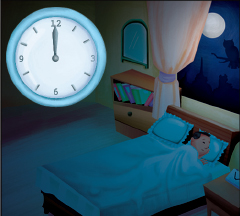
a los veinticuatro años at the age of twenty-four Íbamos a más de noventa kilómetros por hora. We were going at over ninety kilometres an hour.
5 (with dates) Estamos a nueve de julio. It’s the ninth of July.
6 (with prices) Los huevos están a un euro con cincuenta la docena. Eggs are one euro fifty a dozen.
7 (before an infinitive or a direct object) Voy a verla. I’m going to see her. Vine a decírtelo. I came to tell you. Me obligaban a comer. They forced me to eat. Nos cruzamos al salir. We bumped into each other as we were going out. Se lo di a Ana. I gave it to Ana. Le enseñé a Pablo el libro que me dejaste. I showed Pablo the book you lent me. Se lo compré a él. I bought it from him. Vi a Juan. I saw Juan. Llamé al médico. I called the doctor.
abajo ADVERB
1 below Los platos y las tazas están abajo. The plates and cups are below. La montaña no parece tan alta desde abajo. The mountain doesn’t seem so high from below. Mete las cervezas abajo del todo. Put the beers right at the bottom. El estante de abajo. The bottom shelf.
2 downstairs Abajo están la cocina y el salón. The kitchen and lounge are downstairs. Hay una fiesta en el piso de abajo. There’s a party in the flat downstairs.
la abeja NOUN
bee
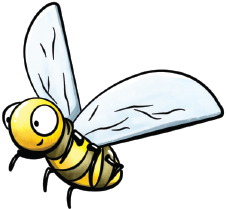
el abeto NOUN
fir tree
abierto
abierto can be an adjective or a verb.
A (FEM abierta) ADJECTIVE
1 open ¿Están abiertas las tiendas? Are the shops open?
2 on No dejes el gas abierto. Don’t leave the gas on.
B VERB ▷see abrir He abierto la puerta. I’ve opened the door.
abrazar VERB
to hug Al verme me abrazó. He hugged me when he saw me. ¡Abrázame fuerte! Give me a big hug!
■ abrazarse to hug Se abrazaron y se besaron. They hugged and kissed.
el abrazo NOUN
hug ¡Dame un abrazo! Give me a hug!
un abrazo love
Did you know…?
Did you know that Spanish speakers sometimes end e-mails, postcards, and letters to friends with un abrazo?
abrigar VERB
Esta chaqueta abriga mucho. This jacket’s really warm.
■ abrigarse to wrap up well
el abrigo NOUN
coat
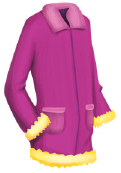
un abrigo de pieles a fur coat ropa de abrigo warm clothing
abril MASC NOUN
April
Language tip
Months are not spelled with a capital letter in Spanish.
Nació el veinte de abril. He was born on the twentieth of April.
en abril in April
abrir VERB
1 to open Las tiendas abren a las diez. The shops open at ten o’clock. Abre la ventana. Open the window. ¡Abre, soy yo! Open the door, it’s me!
2 to turn on Abre el gas. Turn the gas on.
■ abrirse to open De repente se abrió la puerta. Suddenly the door opened.
abrocharse VERB
to do up Abróchate la camisa. Do your shirt up. Abróchense los cinturones. Please fasten your seatbelts.
la abuela NOUN
grandmother mi abuela my grandmother ¿Dónde está la abuela? Where’s Gran?
el abuelo NOUN
grandfather mi abuelo my grandfather ¿Dónde está el abuelo? Where’s Granddad? mis abuelos my grandparents
aburrido (FEM aburrida) ADJECTIVE
1 bored Estaba aburrida y me marché. I was bored so I left.
2 boring No seas aburrida y vente al cine. Don’t be boring and come to the cinema. una película muy aburrida a very boring film
aburrirse VERB



